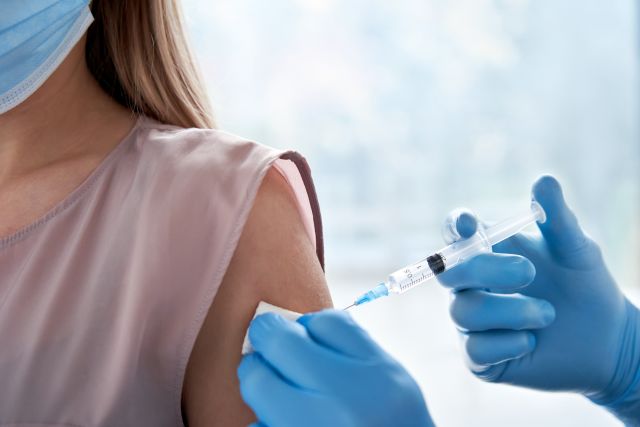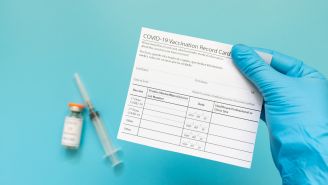Updated on January 10, 2022.
Once again, the world has been plunged into a “wait and see” limbo. As the pandemic wears on into its third year, the Omicron variant has raised alarms and sparked some very unsettling questions.
Is this new variant more contagious than Delta? Does it cause severe disease? Will it evade immunity from existing vaccines or past infection?
Scientists are racing to answer these and other questions about Omicron. Research is ongoing but early data is starting to become available.
Early data suggests Omicron is more contagious
Delta remains the dominant COVID strain, accounting for most new cases in the U.S. but Omicron is on the rise. Experts fear that it has the potential to out-compete Delta.
Since it was classified as a “variant of concern” by the World Health Organization (WHO) on November 26, Omicron has quickly become the dominant strain in the United States. As of January 1, it accounts for an estimated 95 percent of new U.S. COVID cases.
Preliminary data from Japan that has yet to be published or peer-reviewed suggests that Omicron is more than 10 times more infectious than the original coronavirus strain and more than twice as infectious as Delta. The research, which is based on extensive computer modeling, also estimates that Omicron may be twice as likely to evade existing vaccines.
Scientists in South Africa have been testing existing COVID-19 vaccines against Omicron. Their early findings also suggest the variant has “robust ability” to evade them—though not entirely.
Researchers at Africa Health Research Institute tested 14 blood samples from 12 people against the Omicron variant. All 12 people were vaccinated. Half of the people had never tested positive for COVID while the remaining six had recovered from a previous infection.
The preliminary findings have not yet been peer-reviewed, but overall, Omicron resulted in a roughly 40-fold reduction in levels of neutralizing antibodies among those who had received two doses of the Pfizer shot than the original COVID strain. The researchers noted that a booster shot would probably lower the odds for infection, particularly severe disease.
Some good news: Pfizer and BioNTech also have early results of a laboratory study released on December 8, which shows that while the initial two doses of its mRNA vaccine were "significantly less effective” at protecting against Omicron, a booster shot was able to effectively neutralize it in lab tests.
Compared to two doses, the data showed the Pfizer booster increased neutralizing antibody levels by 25-fold against Omicron. The companies said the antibodies triggered by their booster neutralized Omicron to levels comparable with two doses of the vaccine against the original coronavirus strain, which are associated with a high level of protection.
“Although two doses of the vaccine may still offer protection against severe disease caused by the Omicron strain, it’s clear from these preliminary data that protection is improved with a third dose of our vaccine,” said Albert Bourla, Pfizer’s chairman and chief executive officer, in a December 8 news release.
Experts push for vaccinations
Since South African health officials alerted the world to the emergence of the heavily mutated Omicron variant, the stock market has taken a wild ride, health officials renewed warnings about a fresh wave of new infections, and many more Americans rolled up their sleeves to get vaccinated against COVID-19.
U.S. COVID vaccinations have spiked as the number of states confirming cases of the Omicron variant increases. The CDC reports that 2.2 million doses were doled out on December 3—the biggest jump in vaccinations since South Africa raised alarms on November 24. As of January 6, 62.4 percent of the U.S. population is fully vaccinated, 74 percent has gotten at least one shot and 35.3 percent of the fully vaccinated have received a booster.
The effectiveness of existing COVID vaccines has declined since mid-summer as more time had passed since people got their shots and highly contagious Delta variant emerged. Scientists warn that anyone with an Omicron infection could spread it to others—even if they don’t have any symptoms and they are fully vaccinated. This is why U.S. regulatory and health officials approved the emergency use of COVID boosters for all adults, and for young people ages 12 to 17-years old who got the Pfizer vaccine.
U.S. health experts are advising all those eligible that getting fully vaccinated and boosted is still the best way to protect themselves, stressing that:
- COVID vaccines are currently the best protection we have against severe illness, hospitalizations, and deaths.
- Even if Omicron is less vulnerable to COVID vaccines, they are still likely to provide some level of protection. So those who do become infected are less likely to develop serious disease. (Remember, even if you are not classified as high-risk, there are people in your community who are more vulnerable.)
- Based on Omicron’s genetic makeup, some COVID treatments may be less effective, but others may hold up.
Will Omicron make people sicker than Delta?
We just don’t know yet. But early data released by South Africa suggests the variant may not be as severe as initially thought. A report issued by the South African Medical Research Council describes a snapshot of activity at several hospitals in Gauteng Province, where Omicron was first identified. Despite a sharp rise in new cases and hospital admissions, most patients had mild symptoms and the majority could breathe on their own without the need for supplemental oxygen. In fact, the researchers noted some of the people with Omicron infections were admitted for other medical reasons and their coronavirus infections were picked up incidentally. On average, hospital stays were also about five to six days shorter than in previously waves. Although breakthrough cases were reported, most have been mild.
The researchers point out that this data is just a small sample size and much more investigation is needed to fully understand Omicron’s severity.
What do we know about Omicron’s mutations?
There are a lot of them. Omicron contains many mutations—more than any other known COVID variant. These mutations include more than 30 changes to the spike protein that the coronavirus uses to infect cells. (The spike protein is also the target of existing COVID vaccines.) Some of these mutations were also found on Delta and are associated with greater infectiousness and less susceptibility to antibodies.
But the existence of these mutations does not mean that Omicron really is more contagious or more severe.
Mutations could make a virus more dangerous, but they could also make it less worrisome. Remember, unlike bacteria, viruses need a host to “survive” or replicate. So, killing their host isn’t an ideal strategy. If a virus is too severe, hosts may be less likely to spread the infection to others because they become too sick or they die.
There is also more to the immune system than antibodies. It’s also possible that killer T cells, a group of immune cells that can target and destroy infected cells could also bolster protection against COVID-19—even if antibodies are rendered less effective.
Why? Studies have shown that T cells may have a greater defense to emerging variants. Those with coronavirus infections tend to produce T cells that target 15 to 20 different pieces of coronavirus proteins. Which fragments these cells target may vary from one person to the next. This means that across the population, a wide variety of T cells could help prevent the coronavirus from escaping the crosshairs of the immune system.
T cells target viruses after they invade the body, they do not prevent infection. But they can help clear infection, help prevent an infection from becoming severe and they can reduce people’s viral load so that they are less likely to spread the infection to others.
While the world awaits more clarity on Omicron, health officials urge everyone to follow proven strategies to reduce risk of infection: vaccination, wearing masks, distancing, and washing hands well and often.






